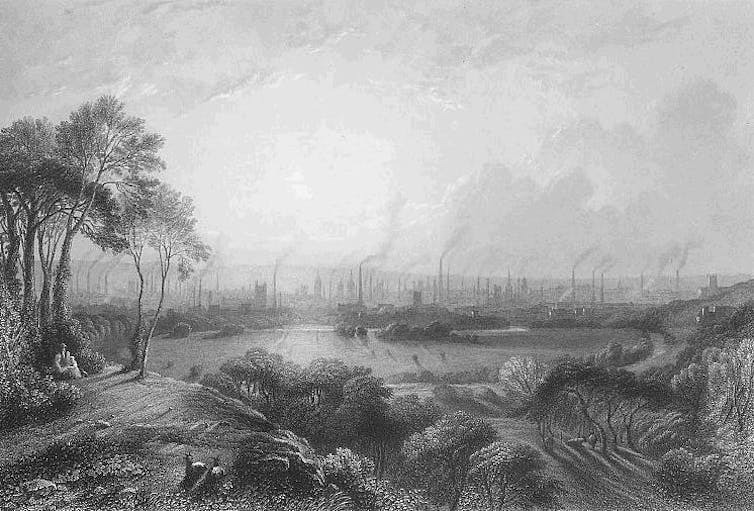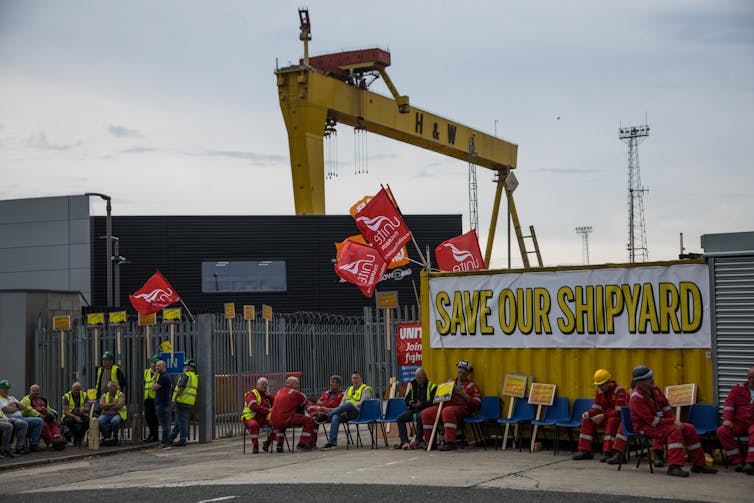
Matt Perry, Newcastle University
How did a billionaire win over coal miners in Pennsylvania and West Virginia to become president? Three words: “Trump digs coal”. By linking deindustrialisation and the decline of working communities in America’s “rust belt” to environmental regulation, Donald Trump could paint his greener rivals as out of touch with the concerns of ordinary Americans. Never mind that climate change and pollution will hit working class people hardest – when it’s “jobs or the planet”, the former will always be a more immediate worry for the precarious and impoverished.
It needn’t be that way though. The campaign for One Million Climate Jobs, organised by the Campaign against Climate Change Trade Union Group, has put workers at the forefront of its vision for tackling the climate crisis. The proposals for a Green New Deal in the US and the UK are supported by trade unions which represent millions of workers. Both projects demand jobs are protected and new ones created as part of a “just transition” from the carbon economy.
The Trade Union Congress (TUC) backed the September 20 day of international climate strikes and millions of workers joined the protests that school students had launched. This kind of mass mobilisation will be crucial to climate action and the role trade unions play will be indispensable. But worker-led environmentalism isn’t a recent phenomenon – the history of labour and green movements are intertwined.
You have nothing to lose but your planet
Trump’s “workers-versus-the-planet” framing misunderstands the origins of the climate crisis, which go back to the private enclosure of common land in the UK. This forced people from rural areas and into crowded urban slums, creating the first proletariat. Once there, industrialists switched from water-powered mills to coal-powered factories to intensify the work routines of these new urban workers.
Coal powered travel helped bosses find cheaper labour overseas and strengthened their authority over an insurgent working class. At every step, workers resisted this transition. The high point of this long battle was the English plug riots of 1842 – viewed as the world’s first general strike – when textile workers literally pulled the plug on the coal-fired boilers of their factories.
In their new urban grimescapes, workers suffered from the toxic raw materials and effluence of the factories they worked in. Class determined whether city dwellers lived in the smog around chimneys or with clean air in leafy suburbs, and it still does.

Wikipedia
Born out of the acute stress of living in polluted and disease-ridden slums, working class movements won public health reforms that have became the standard, such as proper sanitation and rubbish disposal. Working class people have always valued nature in leisure time too, whether it’s cycling, fishing, pigeon-fancying, dog walking or tending allotments.
Unions have long campaigned against workplace hazards, and it’s workers who fight the impacts of climate change every day. Firefighters risk their lives to rescue people from more frequent flooding and wildfires and the Fire Brigades Union has campaigned against staff cuts, inadequate levels of equipment and a lack of training to deal with hazards like polluted floodwater.
A world to win
Environmental struggles litter labour history, but they’re not always the stories you read about. The modern environmental movement emerged, to a large extent, from Rachael Carson’s brilliant Silent Spring – a book published in 1962 which revealed the devastating ecological consequences of pesticides in post-war America. But the book overlooked the acute burden on vulnerable agricultural workers who are forced to use these chemicals.
During a spectacular organising drive and protests by the United Farm Workers in the 1960s, union leader Cesar Chavez exposed the damage these toxins caused to Latino labourers, winning concessions from their employers and standing up for them against anti-migrant racism.
Today, the shipyard that built the Titanic – Harland and Wolff in Belfast – is threatened with closure, but its workers are defiant. They demand that the shipyards be nationalised and used to create renewable energy infrastructure. This offers an exciting glimpse of the leading role that workers can take in the enfolding response to the climate crisis.

DJ Wilson/Shutterstock
Elsewhere in the world, labour organisations have allied with indigenous people against developments that threaten their lands and destroy the local environment. In British Columbia, unions supported First Nation resistance to pipelines and tar sands oil extraction, while the rubber tappers’ union demonstrated against destruction of the Amazon rainforest.
Such a broad alliance is needed to tackle climate change, and that means mobilising labour in its widest sense – women in the household economy, the rural poor, indigenous people, fishing communities, the unemployed and school students. Equally, understanding the configuration of power and ideology that drives the fossil fuel economy – big businesses, geopolitical rivalry over oil and gas resources, nationalistic buck-passing, corporate PR and those who blame overpopulation. With CO₂ emissions rising, there’s little time to waste.
Working class environmentalism is part of the solution to the climate crisis. If successful, the movement will give new meaning to the old maxim: “the cause of labour is the hope of the world”.
Matt Perry, Reader in Labour History, Newcastle University
This article is republished from The Conversation under a Creative Commons license. Read the original article.


Be the first to comment